
15. 100th Anniversary of the
End of the First World War
1918-2018
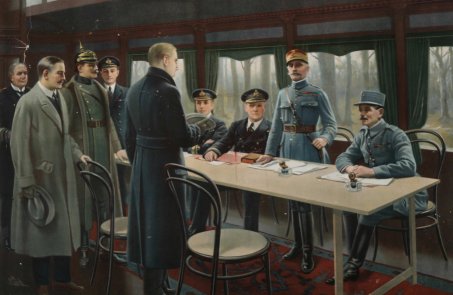
Also see Dishonourable Peace: 98th Anniversary of the End of the First World War
I had thought of sub-titling this essay, 'The War That Should Never have Been', because I feel that both as an Englishman and a European with a passion for Prussia. If Prussia formally ended in 1947, when the Free State was dissolved by the victorious Allied powers, it would be true to say that it, along with European Christian civilisation, was fatally poisoned on the fields of northern France on 11 November 1918 at 11 a.m. and consisigned to a lingering death for just under 30 years. It's death took place in three phases:
- 1. Defeat in the First World War and the abdication of the Kaiser;
- 2. The Preußenschlag of 1932 followed by the replacement of Prussia by nazi Gaue under the Hitler régime in April of 1933; and
- 3. The final Dissolution by the Allied Control Council on 25 February 1947.
By 11 November 1918, 8 million soldiers lay dead, with a further 20 million wounded, diseased, mutilated or suffering the aftermath of gas attacks. In addition, 22 million civilians lay dead or were wounded. To put things into perspective, the casuality rate of the Great War was ten times higher than the American Civil War which had been the bloodiest war of the 19th century. We are appalled by these figures but may perhaps not realise that they are dwarfed by the genocides caused by Lenin, Stalin and Hitler.
The First World War was totally unnecessary. And though we have the unfortunate tendency to want to blame particular nations for starting this fratricidal war of European nations, the responsibility does not, as Sir Patrick Hastings would remark in 1948, lie with the nations involved but with certain individuals. Today I shall name a few names, though more could be added to the list, whilst not denying that the processes involved are complex and may not, in the final analysis, easily yield to scientific examination. History is a strange creature only because men are strange and no one particular nation - at least not in Europe and North America, which share a common Christian civilisation - may be said to have men (or women) 'stranger' than any other. More once united us a century ago than currently divides us now, save the 'unity' of the Marxist camp and its liberal allies who despise nations, Christianity and conservatism and even more.
Individuals make or break nations. Love of country and love of the House of Hohenzollern - thanks in the main to the enlightened rule of Friedrich der Große (Frederick the Great) - and the more so as one moved eastwards into the Prussian heartland of Brandenburg, Pomerania, Silesia, West and East Prussia - united Prussians in 1813 against the imperialistic oppression of Napoleon Bonaparte. The principle movers of Prussia then were undoubtedly Yorck von Wartenburg and Stein who in Breslau persuaded Friedrich Wilhelm (Frederick William) that it was time to rise to the challenge and finally turn on the French tyrant.
Even left-wing elements, like the East Prussian Johann Jacoby, who wanted Prussia to forego its identity for the sake of German unification, eventually reversed their position when they realised the importance of Prussian autonomy and development. To this day, as mentioned in an earlier article, the Social Democrats of Germany look back with fondness at the rôle played by the Free State of Prussia in Weimar Germany for its integrity, honesty and industriousness in standing by its elected masters from the moderate left. Back then both left and right saw the virtues of Prussianism. And before the disasterous partitions following 1918, Prussia was able to maintain a happy relationship between the German majority and its minorities (in all but the Province of Posen) - Germans, Sorbs, the Kashubians of West Prussia, the Schlonzaks of Silesia, the Masurians and Courlanders of East Prussia, and a good many Poles. Thanks to Prussianism, there was a family identity.
One of the people to ruin all of this was, in my opinion, President Woodrow Wilson of the United States whose policy of the 'self-determination of peoples' whilst sounding good on paper, was only ever applied selectively and whose result was the fracturing of society. As Walter Lippmann commented:
"Self-determination, which has nothing to do with self-government but has become confused with it, is barbarous and reactionary: by sanctioning secession, it invites majorities and minorities to be intransigent and irreconcilable. It is stipulated in the principle of self-determination that they need not be compatriots because they will soon be aliens. There is no end to this atomization of human society. Within the minorities who have seceded there will tend to appear other minorities who in their turn will wish to secede" [1].
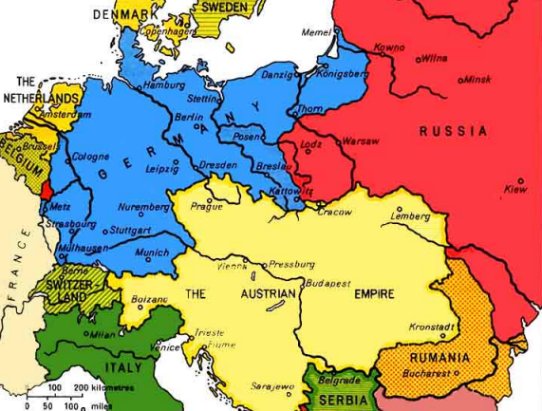 Central Europe at the Outbreak of War in 1914
Central Europe at the Outbreak of War in 1914
After the Great War, plebiscites were applied fairly in two locations only: (1) the Masurenland (Masuria) of East Prussia (Ostpreußen), and (2) Kärnten (Carinthia) in Austria, where the population voted overwhelmingly for retention within Germany and Austria, respectively. When the Upper Silesian (Oberschlesien) plebiscite resulted in a 60 per cent vote for Germany, instead of returning the province to Prussia, it was partitioned and the richest coal-bearing areas given to Poland along with its capital, Kattowitz, which had an overwhelmingly German majority. Schleswig was artifically divided into two voting zones ensuring that some of the territory would be awarded to Denmark, as those policing the vote knew a majority would vote for Germany. No plebiscite was held in either the territories of Danzig, Memelland or West Prussia (Westpreußen) as a whole which, according to my analysis, would (in the case of West Prussia) have voted for Germany along the same lines as Upper Silesia. And, of course, no plebiscite was held in Posen Province either which, had such been conducted there, would have resulted in far more territory being allocated to Germany than the Treaty of Versailles in the end unilaterally transferred (the Grenzmark Post-Westpreußen). Danzig and Memel would overwhelmingly have voted for retention within Germany and, beyond any shadow of a doubt, so too would Alsace-Lorraine (Elsaß-Lothringen).
The plebiscites demonstrated that the Allies had no intention of respecting the Wilsonian declaration of the right of self-determination anyway. Indeed, they had assumed, since they were a Slavic people, that the Masurians of East Prussia (Ostpreußen) would have voted for Poland but failed to realise that the Masurian allegiance was not based on race but culture - specifically, Prussian culture. As it was, in the East Prussian plebiscite, 98 per cent voted for Germany! Had plebiscites been carried out faithfully in all the territories considered for transfer to other nations, as ought to have happened, only a portion of Posen would have been yielded to Poland, as indeed the Kaiser himself had suggested ought to be done anyway, thus giving no excuses for another casus belli in the future. There would have been no future Hitler and no Second World War if this had been done.
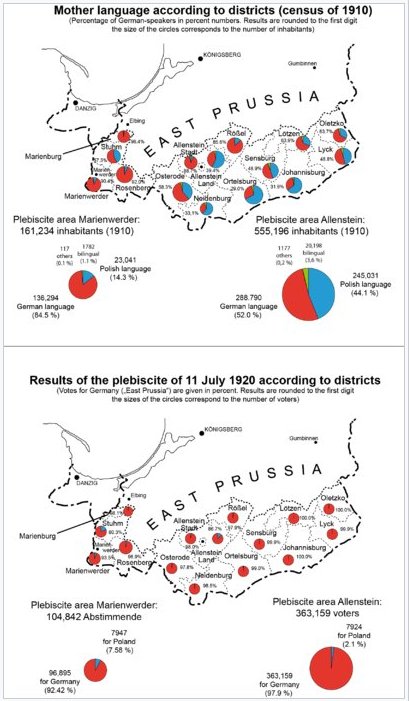
George F. Kennan, in tracing the origins of the Cold War (1945-91), concluded that "all lines of inquiry lead back to World War I". It was, he concluded, "the original catastrophe", and as historian Jacques Barzun concurred, it was "the blow that hurled the modern world on its course of self-destruction." Without it, there would have been no communism and no fascism, no gulags and no holocaust, no Second World War to increase the tally of the dead and wounded by tens of millions more, and no terrible communist revolution in China that would claim 50-60 million more lives.
There were plenty of people of good will on the Allied side willing to act fairly but the purpose of the post-war treaties was not to be fair but to punish and humiliate. The Italians and British wanted to act fairly in Upper Silesia, at any rate, but the French were out for revenge for their humiliating defeat by Prussia in the Franco-Prussian war of 1871 which the French had themselves played a major hand in provoking because of their imperialistic ambitions to create a Rhineland territory separated from Prussia under their control. Their hatred led to to the disaster of 1940 and Compiègne.
Patrick J. Buchanan calls the two world wars "fratricidal, self-inflicted wounds of a civilization seemingly hell-bent on suicide" [2]. Had Britain stayed out of either or both wars, they would not have turned into world wars, and the United States would not have been drawn in. The 1914 war would have been over within a year or two, Germany would have won, and the Alsace-Lorraine question settled permanently. A few frontier forts like Belfort would have been demolished and Europe would have got back to peace. The Kaiser had never wanted a war with Great Britain. He was, after all, the eldest grandson of Queen Victoria. The research of historians like Patrick Buchanan pretty much confirms that Britain, as David Lloyd George admitted, "blundered into the war."
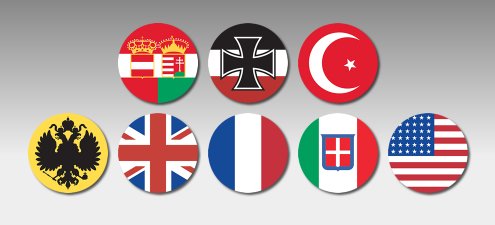 Main combattants (by 1917): Top row: Austria-Hungary, Germany,
Main combattants (by 1917): Top row: Austria-Hungary, Germany,
Ottoman Empire (with Bulgaria); Bottom row: Russia, Britain, France,
Italy, USA (with Serbia, Monte-Negro, Romania, Portugal and Greece)
I have pointed fingers at Woodrow Wilson thus far but there are many others who were responsible for the Great War disaster, whether directly or indirectly. Even the Kaiser, Wilhelm II, undoubtedly made some blunders, competing with the British navy being one of them. It did not help that Admiral Tirpitz was an Anglophobe. The British, the Kaiser naïvely reasoned, would respect him and seek Germany as an ally instead of a potential threat with two comparible High Seas Fleets. Both the Kaiser and Tirpitz were wrong. The British also were unwilling to pay the Kaiser's price for German naval self-limitation (even though Germany did so voluntarily in 1913 because it was bankrupting the treasury), which was to stay out of any future continental war. The way Germany saw things, Britain could have the high seas so long as Germany could count on British non-interference in any future conflict with France by maintaining neutrality. What Germany did not understand was the nature of Britain's foreign policy which was to maintain a balance of power as a kind of global policeman, a rôle assumed by the United States after 1945 when Britain was too enfeebled militarily and economically to do so any more, bankrupt and in debt as she was to the USA.
But Wilhelm II's biggest mistake, in my view, was his failure to maintain good relations with Russia by allowing Bismarck's Reinsurance Treaty with Russia to lapse. He should have renewed it. The Tsar was, after all, a cousin. And the Treaty would have been renewed had he not dismissed the Iron Chancellor who was undoubtedly a better statesman than he. It should be remembered that Germany, having acquired by 1871 the German-speaking territories it wanted under its umbrella (minus Austria), last of which was Alsace-Lorraine, had no further desire for expansion. France, on the other hand, always had its eyes on Alsace-Lorraine and the Rhineland, and Russia wished to gain control of Slavic Bulgaria and the Turkish Bosphorus.
Kaiser Wilhelm strove for an Anglo-German Alliance all his life but sadly without success, so who sabotaged it? Some of his ministers, for sure, in instigating the Moroccan crises of 1905 and 1911. But the fault was not entirely from the German side. British statesmen like Lord Salisbury and Sir Edward Grey, who looked down haughtily on the Kaiser, must also shoulder much of the blame. Queen Victoria's son and the next King of England, Edward VII, did not help matters either. While the British tried to cosey up to the United States, which wished the destruction of the British Empire (and indeed all empires, including the German, Russian and Austro-Hungarian), they ignored their real friends and natural allies in Berlin. Why? Because, as journalist Peter Hitchens has pointed out, the British élites bought into the lie that the UK and USA had a 'special relationship' (as least on a surface level) that never actuality existed but which was later promoted for propaganda purposes in two world wars, though I think the deeper reason has more to do with Deep State globalist politics. [3] Things are rarely as they seem to be in politics.
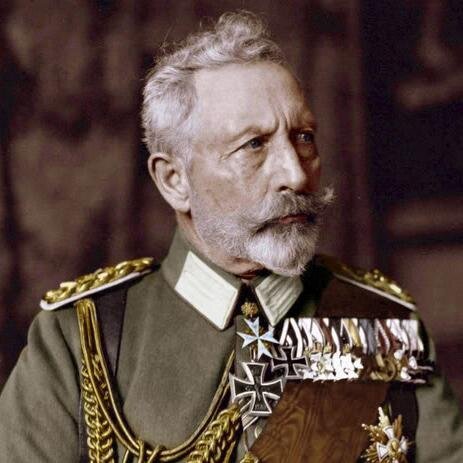 Kaiser Wilhelm II
Kaiser Wilhelm II
Without a doubt, in my mind, one of the greatest enemies of an Anglo-German alliance, or at the very least a 'common understanding', was Sir Edward Grey, for it was he who engineered Britain into a secret alliance with her traditional enemy, France. And he was, beyond a shadow of a doubt, as Liberal Foreign Secretary, the leading statesman behind the decision of Britain to enter the Great War. He was as much a Germanophobe as Tirpitz was an Anglophobe. How come, then, Grey got his way for war when the majority of his government were against it? Because he entered an alliance with France behind the government's back! Only two others knew of this secret deal, two other men who bear a heavy responsibility for the First Word War: David Lloyd George (Chancellor of the Exchequer, the minor partner) and Winston Churchill (Home Secretary who was then transferred to the Admiralty, the major player).
Ironically, before America was persuaded to join the Allies in 1917, the USA and Germany saw eye-to-eye. In May 1914 Colonel Edward Mandell House whom President Wilson regarded his "independent self", reported to his master:
"The situation is extraordinary. It is jingoism run stark mad. Unless someone acting for you (Wilson) can bring about a different understanding, there is some day to be an awful cataclysm. No one in Europe can do it. There is just too much hatred, too many jealousies. Whenever England consents, France and Russia will close in on Germany and Austria" [4].
It is not generally known that Imperial Russian ambitions during the First World War included at one time the seizure of all German territories east of the Oder-Neiße line which most suppose was a later Soviet scheme to compensate Poland for its seizure of eastern Poland in 1939. Though that became one of the Soviet excuses for annexing Eastern Galicia and Podolia, the original scheme had been hatched in Imperial St.Petersburg, not Soviet Moscow. These territories were to be given to Russian Poland along with more autonomy. (Initially only the territories of West Prussia and Posen were considered for Polish re-incorporation along the borders prior to the three partitions of Poland). Another curious Russian war aim, since we're on the subject, was the suggestion that the Kingdom of Hannover be restored as a separate nation (i.e. removed from Prussia), presumably to please the British who at one time had owned the territory before losing it to Prussia. The Russians also agreed that the French should be given a free hand in Alsace-Lorraine and the Rhineland (as well as Luxemburg) and even considered the more drastic dismembership of Germany into its pre-1871 constituent states once again.
It should also be noted that the French wanted a customs union with Belgium after the war (not unlike that which was forced on the Free State of Danzig with Poland) which of course meant effective control. So much for the anti-imperialistic 'moral outrage' over the German incursion into Belgium in 1914. Mind you, Belgium is an anchronism of history, a purely artificial entity created by the British as a buffer zone between France and Prussia after the defeat of Napoleon. It ought to have been partitioned between Holland and France, in my opinion, along the Flemish-Wallonian linguistic line, and may yet suffer this long overdue 'fate'.
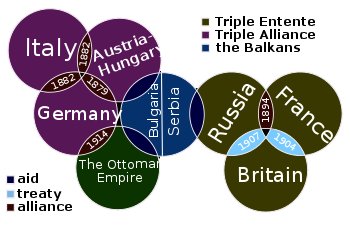 The Alliances and Arrangements Between the Great and Minor Powers on the Outbreak of World War I. Italy would eventually pull out and join the Allies at the prospect of territorial expansion at the expense of Austria-Hungary
The Alliances and Arrangements Between the Great and Minor Powers on the Outbreak of World War I. Italy would eventually pull out and join the Allies at the prospect of territorial expansion at the expense of Austria-Hungary
The way the Great War escalated from being a local disagreement between Austria and Serbia is a story in itself. The Austrians did not want a continental conflict. Their sole desire was to punish Serbia in a quick war to punish it for murdering the heir to the Habsburg throne in Sarajevo and to stamp out Serbian plotting to destroy their empire. They were not wrong in suspecting the Serbs wanted to unite all the southern Slavs into a single nation under their leadership (as eventually happened in the formation of Yugoslavia). However, there is no doubt that Austria expected too much, in making ten harsh demands on the Serbs. The Serbs accepted nine of them. It was the tenth that was the sticking point. The Austrians wanted to send a delegation to Belgrade to oversee the investigation and prosecution of the conspirators who has murdered Archduke Ferdinand and his wife; the Serbs wanted the International Court of Justice to handle the affair. The Austrians should have agreed but instead declared war on Serbia on 27 July 1914 and began shelling Belgrade.
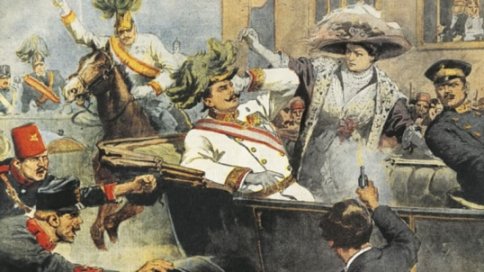 Murder of the Archduke Ferdinand by a Serbian terrorist that triggered the war
Murder of the Archduke Ferdinand by a Serbian terrorist that triggered the war
Three-quarters of the British cabinet viewed this as a domestic affair between Austria and Serbia and wanted to stay out of it. So why didn't it stay that way? How was Britain drawn into the conflict? Grey and Churchill mobilised their influence for war. An insight into Churchill's mind is instructive at this point for there can be no doubt that he was champing at the bit for war. In a letter to his wife he wrote:
"Everything tends toward catastrophe & collapse. I am interested, geared up and happy. Is it not horrible to be built like that?"
Anyone who has studied the life and works of Winston Churhill will know that he was a rapacious war-monger. Whilst the rest of his government associates were stricken with grief at the outbreak of war, Churchill alone was buoyant. The story of how Britain entered the war is too complex to go into here. Only a minority wanted war. The reason Britain did go to war was to save Asquith's Liberal Government which was on the verge of collapse. Lloyd George was initially neutral but the opportunistic and cynical Churchill, who in actually cared little for Belgium, pressed him hard. And it needs to be remembered that Belgium had behaved with unstinting barbarity in its Congo colony under King Leopold, a regime which had cost that African nation 10 million people to murder, starvation and disease, being responsible for the first modern genocide committed by a European power. It is also little known, but true, that Churchill himself was prepared to violate Belgian neutrality had Germany not invaded by imposing a naval blockade on Antwerp to prevent goods reaching Germany. There was therefore no superior 'morality' on the part of Britain for its casus belli - this was realpolitik.
As early as 1911, Churchill had confided to Lloyd George that he was secretly committed to bringing Britain into any future Franco-German war. Without a doubt, it was the arrival of the British Expeditionary force in France in 1914 that ruined the Schlieffen Plan that would have brought Germany a swift victory against France like that of the Prussian victory in 1870-1. Public opinion was whipped up for poor Belgium in the British press once von Kluck's troops had crossed the border on 4 August into it and the war was unstoppable.
Lloyd George came to bitterly regret being lassooed in by Grey and Churchill. The Prime Minister was equally appalled by the enthusiasm that had been whipped up by the press. The people would not be so enthusiastic later as the cream of British society was slaughtered, along with that of the French and Germans, on the battle fields of the Somme and elsewhere.
The First World War was a totally unnecessary war. It was a disaster for every country in Europe and ultimately the USA and world too. Few wanted the war. The British cabinet didn't. The Kaiser didn't. The Austrians didn't. The French, of course, wanted revenge for their humiliation in 1871. It took only a few well placed key figures to manipulate public opinion and ignite the powder keg. That's the way it has always been done. The wars being fought in the Middle East today are no different.
Four years later in 1918 - exactly 100 years ago today - Germany sued for an armistice and the rape of that nation, along with Austria-Hungary, commenced. We sometimes speculate what would have happened if Hitler had never been born. But what if Churchill hadn't been born? Or Grey? Or the Serbian assassin Princip? What if...? Europe and the world would have been a very different place had the Great War never happened. The Ottoman Empire would eventually have collapsed, and so would have the polyglot Austro-Hungarian and the Russian Empires.
We can speculate as to what might have happened. The eastern Prussian territories would still exist, perhaps minus parts of Posen. The Sudeten Germans would still be in Bohemia and Moravia. National minorities like the Czechs, Slovaks, Poles and Balts would eventually have gained autonomy and independence. I can forsee how Germany, Austria-Hungary and Russia might one day have got together and agreed to give Poland its independence - Galicia from Austria, Posen from Germany, and core Poland from Russia. I can see how Austria and Hungary might have separated, with Austria federating with Germany, accomplishing what Bismarck had failed to do in his day. I could see Bohemia-and Moravia, along with Slovenia, remaining in Austria as self-governing entities within a larger, propserous, German Federation. Or the Czechs going their own way leaving the Sudenten territories to Austria and the German Federation.
But we must deal with reality. This is a cruel world and justice is not common in it. Nevertheless, a Christian Prussia might well have survived in Germany under the Hohenzollerns. I think the Habsburgs would eventually have outlived their usefulness. Russia would have remained a monarchy but eased into a constitutional one and so prevented the Boshevik uprising with all its horrific blood-letting and oppression. China might have finally come together as a National Democratic Republic. Japan would have remained an ally of Britain and not gone down the path of Asian conquest.
Today is a very, very sad today. Coming from an Englishman, whose nation 'won' the war, might suprise some, but I am first and foremost a realist. I love my country but I also love our European civilisation, for all its faults. A continuing Anglo-Prussian alliance might have been good for Europe even if some of the continent's people might not have liked it. None of the animostity that exists between nations, even still, would exist. By granting Poland independence and being fair in territorial allocation based on ethnic majorities, Russia, Poland and Germany could have got on. Today they 'get on' only on the surface, because they have been compelled to, because unless differences are sorted out amicably, they can have no permanence.
A forced treaty has given Poland, Russia and Lithuania the Oder-Neiße territories, signed by an illegal entity, the 'Federal Republic of Germany', in reality an Anglo-French-American-controlled Corporation. The only legal entity in Germany today is the Weimar Republic, including the Prussian nation and its eastern territories. As we have seen, the post-World War I plebiscites were not conducted fairly, so the Weimar borders ought to be adjusted. At the same time, the minorities within these borders ought to be given autonomy if they want it - the Schlonzaks, Kashubians, Sorbs and others - including the French minority in Elsaß-Lothringen (Alsace-Lorraine). Do I think it is ever going to happen? No. Too much time has passed, too much water has gone under the bridge, too much has changed. But if you are a Christian, as I am, then you can at least hope that justice will be done when our Lord returns.
A century has passed and I am not going to memorialise either the Ceasefire of 11 November or the infamous treaties of Versailles, St.German and Trianon any more. We have other things to worry about right now, new invaders on our doorsteps and traitors within our governments and institutions bent on our destruction. That is where our energy has to be focussed today. Will we ever forget the past? Never. We can, and must, correct falsified history. Our duty is to be witnesses to the truth and to show that Christian charity which alone will allow the nations to co-exist peacefully. Where are today's East and West Prussians, Pomeranians and Silesians? Nearly all of them are integrated into German society and have lost their identity. They are scattered throughout the Länder and have intermarried with other German groups. Only a few remember and only a few would ever want to go back to their ancestral homes. That's reality. Yes, some remained who had Polish-sounding surnames and are getting more vocal as a minority (especially in Upper Silesia), but they have changed too.
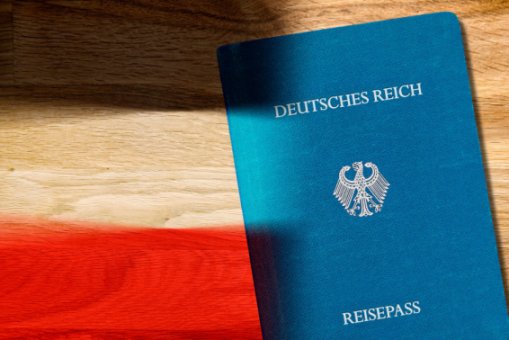
So apart from telling truthful history, what else can we do? We can live the Prussian ethos and show this dying Post-Modernist culture that they need it badly. We can do that. And if you are a German and want to, you could, I suppose, join the Reichsbürger Movement (or at least, one of the moderate groups within it, as there are some extremists there) and get a proper-looking passport. Better still, get a Prussian passport!
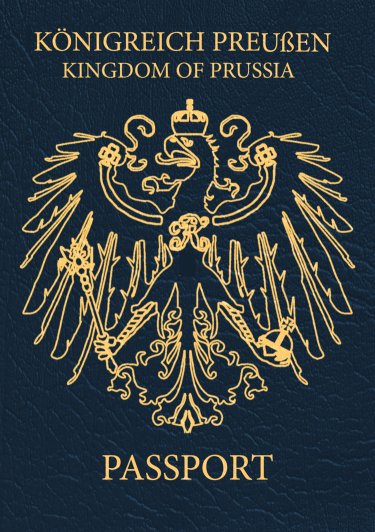
Endnotes
[1] Walter Lippmann, U.S. War Aims (Little Brown, Boston: 1944), p.174
[2] Patrick J. Buchanan, Churchill, Hitler, and the Unnecessary War: How Britain Lost Its Empire and the West Lost the World (Three Rivers Press, NY: 2008), p.xvii
[3] Peter Hitchens, America Isn't Our Special Friend. It Ruined our Navy, Empire and Future (24 April 2016)
[4] Niak Furguson, The Pity of War (Basic, NY: 1990), p.153; Giles MacDonough, The last Kaiser: The Life of Wilhelm II (St.Martin's Press, NY: 2000), p.360; Ralph raico, 'World War I - The Turning Point' in The Costs of War: Amarica's Phyyhic Victories, ed. John Denson (Transaction, Brunswick, NJ: 1999), p.208; G.J.Meyer, A World Undone: The Story of the Great War 1914-1918 (Delacorte Press, NY: 2006), p.727
Comments from Readers
[1] "If any one man could single handedly start a World Wide conflict, this man comes closest. Austrian Foreign Minister Count von Berchtold, or "Poldi". The deceit, deliberate misrepresentation of facts to both Wilhelm and Franz Josef, the utter disregard for attempts by others, including the Hungarian Prime minster to mediate the Serbian crisis, the censoring of any communiques he felt harmful to his plans to punish, annex and divide Serbia, the purposeful misinformation cabled to Berlin... when and if any response was given when Berlin requested updates, his utter disrespect for the advice of peers and other leaders both Austrian, Hungarian and German, and his criminal negligence regarding the political fall-out which could have been avoided if he even bothered to look, his holding back specific information from Franz Josef to secure agreement and, indeed, support, is absolutely astounding.
"What amazes me also is how far he was able to achieve in his goal to punish Serbia. How personal invective from a "dilletante, a snob, as society blade, racetrack gambler, playboy, lover of the soft life, a man outstanding even in his society crowd for his known vacuity of mind and shabbiness of character" (American Heritage History of World War 1, pg 26, viz.) - could go so far and do so much damage and involve so many. The problem was, this man was actually trusted all round.
"Is it any wonder that ever since, illustrations of villains in stories and novels seem almost to be modeled after the visage of "Poldi"??" (GJ, USA, 11 November 2018)
[2] "The collapse of the kingdom of Prussia and the German empire (along with the Austrian and Russian empires) marked the shattering of the old world. The old world, that gave us the reformation of the Christian faith, the enlightenment, the great art, architecture and music of the baroque era, the equality of rich and poor before the law (first put into practice by Frederick the Great's father) the establishment of the social welfare safety net under Kaiser Wilhelm's grandfather in the 1880's. Not perfection - as that is beyond human ability - but nonetheless a glorious and rich heritage.
"In its wake has come turmoil, monolithic spirit-crushing systems, genocide, and a general lack of standards of behaviour.
"The old world was shattered and some of us understand how important it is to treasure those shards of what once was." (BW, USA, 11 November 2018)
[3] "I think German and British interests were somewhat more allied up to the 1914 breach. It was a very complex war politically. The Romanov Gvt. was having a massive meltdown from within and could no longer prosecute a war by 1917. Germany's direct involvement came as a combination of treaty, blood, and a huge dose of deception from the Austrian War Office taking advantage of the Kaiser and staff quite literally on vacation aboard the yacht Hohenzollern in the Baltic. The American Heritage book World War 1 actually does a rather detailed blow by blow on just how the behind-the-scenes hoodwinking of Franz Josef and the Kaiser came about by the Austrian War minister. It has all the intrigue of an Agatha Christie novel!" (GJ, USA, 11 Nov 2018)
Created 11.11.2018 | 12.11.2018
Copyright © 2018 SBSK Preussens Gloria
Alle Recht vorbehalten - All Rights Reserved


